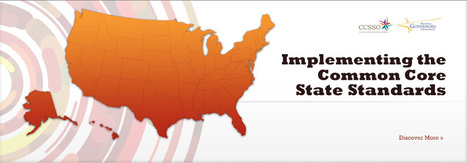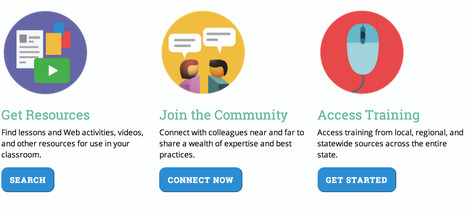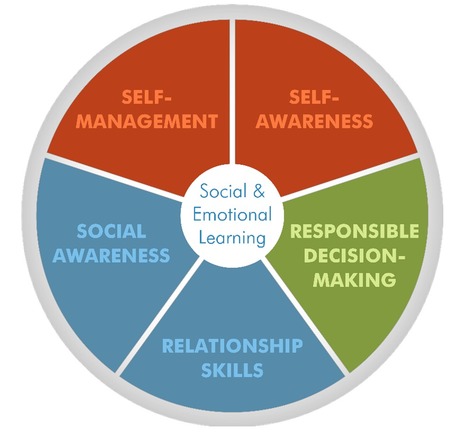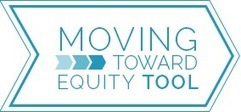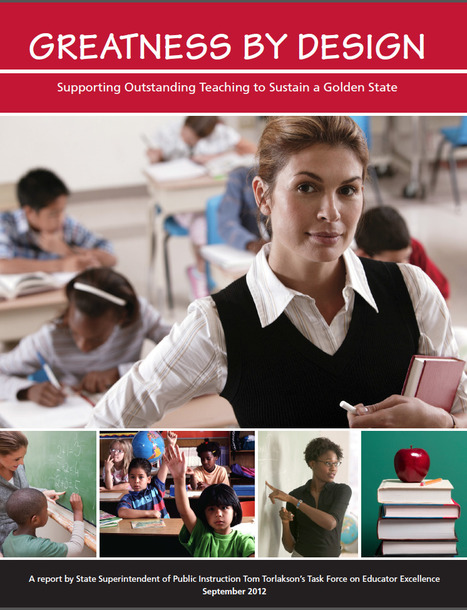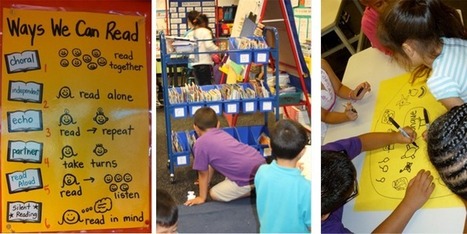 Your new post is loading...
 Your new post is loading...
"The Smarter Balanced Assessment System has three components: summative assessments, designed for accountability purposes; interim assessments, designed to support teaching and learning throughout the year; and formative assessment processes, supported by professional learning and instructional resources located in the Digital Library. The Smarter Balanced Assessment Graphic (PDF) displays the relationship between these components, the Common Core State Standards, and college and career readiness.
The formative assessment process is key to a balanced assessment system. The Digital Library is an online collection of resources aligned to the Common Core State Standards that support K–12 teachers in their use of formative assessment processes to adjust teaching to improve student learning. The Smarter Balanced Digital Library supports educators with the four attributes of formative assessment: (1) Clarify Intended Learning; (2) Elicit Evidence; (3) Interpret Evidence; and (4) Act on Evidence. The Digital Library provides subject- and grade-specific resources intended to help educators apply the formative assessment process during daily instruction. In addition, the Digital Library has collaboration features that allow users to rate materials and share their expertise with educators across the country. Pursuant to California Education Code Section 60642.6, the Digital Library is available to local educational agencies (LEAs) for use in K–12.
The LEA CAASPP Coordinator is responsible for registering new users into the library through the Administration and Registration Tool (ART). A Tip Sheet (DOC) is available to assist with the registration process. Should there be further questions or assistance needed with this process, LEA CAASPP Coordinators should contact the Digital Library Help Desk at 1-855-631-1510 or caltac@ets.org." For main post with live links, please click on title above or here:
http://www.cde.ca.gov/ta/tg/sa/diglib.asp
Committed to providing leadership, assistance, and resources so that every student has access to an education that meets world-class standards, the Council of Chief State School Officers (CCSSO), the California Department of Education (CDE) and the San Diego County Office of Education (SDCOE) proudly announce the Common Core Translation Project. Standards-based instruction is at the forefront of education reform because it presents a framework to ensure that all students are exposed to rigorous content and prepared to contribute positively to an increasingly complex world.
As we prepare to build capacity to implement the new California Common Core Standards (CCCS) stakeholders have identified the need for the translation and linguistic augmentation of the California Common Core ELA/Literacy Standards and Math Standards to Spanish. This translated and linguistically augmented version of the CCSS is important because it establishes a guide for equitable assessment and curriculum development.
In exemplary service to districts, communities and our students, an electronic version of the California Common Core Standards en Español is posted on this website for free public access and is available to individuals in California and across the country.
For full post, click on title above or here:
http://commoncore-espanol.com/
"Edcite is focused on providing teachers an easy way to create Common Core assignments that fit their class. We support Smarter Balanced and PARCC question-types, including ELA passage highlighting, dynamic Math graphs and image labeling. Teachers can easily share assignments in the Edcite Library; where other teachers can discover & tailor these to fit their own classes. Teachers save time not only in assignment creation but also in reviewing student responses using our automated grading and feedback features.
Edcite also addresses a critical issue for students who are unfamiliar with online standardized assessments that are required as most states and school districts begin to move towards the Common Core standards soon. This lack of familiarity limits students' ability to adequately demonstrate their learning and can affect their progress through the K12 system. At Edcite, students can use our Library of teacher-created assignments to get unlimited practice on relevant assignments; and they can get immediate feedback on their performance with suggestions for improvement when needed."
For main website, click on title or image above.
"Digital Chalkboard is an online community of California public school and district educators. California educators collaborate through group participation and discussions, upload educational classroom and administrative resources that help other educators access what works best in California schools and districts. As of the summer of 2014, over 70,000 educational resources have been contributed to the resource libraries. Both featured content providers from select non-profit organizations and approximately 19,000 California educators continue to contribute resources and collaborate."...
https://www.mydigitalchalkboard.org
"EQuIP (Educators Evaluating the Quality of Instructional Products)is an initiative of the American Diploma Project (ADP) Network designed to identify high-quality materials aligned to the Common Core State Standards (CCSS).
The objectives are two-fold:
* Increase the supply of high quality lessons and units aligned to the CSSS that are available to elementary, middle, and high school teachers as soon as possible; and
* Build the capacity of educators to evaluate and improve the quality of instructional materials for use in their classrooms and schools.
EQuIP builds on a collaborative effort of education leaders from Massachusetts, New York and Rhode Island that Achieve facilitated. The outcome of that effort was the development of the “Tri-State Rubrics” and a quality review process designed to determine the quality and alignment of instructional lessons and units to the CCSS."
To access the Achieve website, please click on title above or here: http://www.achieve.org/EQuIP
"Common Standards & Assessments: The Common Core State Standards, Next Generation Science Standards and English Language Development Standards are important tools for ensuring all students have access to rigorous content and college and career preparation. The Education Trust-West Needs Assessment can help district leaders and other stakeholders ensure that their school district is on track for Common Core implementation and our resource page is available to support the equitable and effective implementation of the new, common standards.
The Education Trust - West published “The Billion Dollar Question: How Can Districts and Schools Equitably Implement the Common Core?” in August 2013 to help guide stakeholders towards equitably implementing the new standards and spending the $1.25 Billion allocated by the state for Common Core implementation. The resource pages below are aligned to the ETW needs assessment, including resources related to the Next Generation Science Standards and English Language Development Standards. These resources were hand-picked to help district leaders, practitioners, and community members to access high-quality, equity-focused materials and resources to ensure that the implementation of the new, common standards in schools, districts, and communities across California serve all students."
For full page of resources, click on title or image above, or here: http://www.edtrust.org/west/west-resources/common-core
|
Information and resources about the new academic content standards for English language arts and mathematics adopted by the State Board of Education on August 2, 2010.
http://www.cde.ca.gov/re/cc/
"To help education leaders ensure that all students receive equitable access to excellent educators, the U.S. Department of Education announced the Excellent Educators for All Initiative, which requires each state, alongside stakeholders, to create a State Plan to Ensure Equitable Access to Excellent Educators. Designed expressly to support states in this effort, our Equitable Access Toolkit includes resources and materials to guide state leaders through the most critical aspects of developing these plans—stakeholder engagement, root-cause analysis, and data review. We have also created a sample equity plan template and a Sample State Plan to Ensure Equitable Access to Excellent Educators to assist with this process." For full post and to download toolkit, click on title above or here: http://www.gtlcenter.org/learning-hub/equitable-access-toolkit
"State Superintendent of Public Instruction Tom Torlakson has appointed an Educator Excellence Task Force to focus on the Educator Quality element of the Blueprint for Great Schools and designed to strengthen California’s teacher corps"....
"The Educator Excellence Task Force report provides their recommendations on how to strengthen California's teacher and administrative corps."...
For main website, click on title or image above, or here:
http://www.cde.ca.gov/eo/in/ee.asp
'The "Browse by standards" page allows you to find all resources that support a given standards statement. Reference terms are assigned to each statement within a standards document and to each media resource, and correlations are based upon matches of these terms for a given grade band." http://www.kqed.org/education http://www.pbslearningmedia.org/
To download report, click on title above.
"This is a guest post, written by John R. Walkup, Ph.D., President, The Standards Company & Ben S. Jones, MS, President, Learnerati. You can follow them on Twitter: @jwalkup and @learnerati
In 2009, we coauthored with Karin Hess and Dennis Carlock an article that introduced the concept of Cognitive Rigor, which interlaces Webb’s Depth of Knowledge and the Cognitive Processes Domain of Bloom’s Revised Taxonomy.[1] However, many still confuse the two with regard to rigor.
To briefly clarify the distinction, Depth of Knowledge categorizes the cognitive complexity of an activity, as evidenced by the amount of planning, discussing, fact-checking, and researching employed to accumulate the knowledge needed to complete the activity. In essence, it looks at the structure and complexity required to work with the activity.
Bloom’s Taxonomy, on the other hand, is more neurological; it describes the types of thinking needed to interact with information during an activity. Therefore, it looks more closely at the cognitive demand at the moment for a particular type of information processing. In short, Bloom’s Taxonomy describes a neurological event; Depth of Knowledge describes a broader cognitive process."... For full post, click on title above or here:
http://www.thinkgate.com/lesson-planning-with-depth-of-knowledge-and-blooms-taxonomy
|
 Your new post is loading...
Your new post is loading...
 Your new post is loading...
Your new post is loading...







